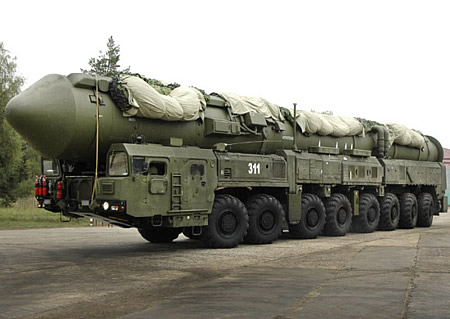New Nuclear Notebook: Russian Nuclear Forces 2012
 |
| More than two-thirds of Russia’s current ICBM force will be retired over the next 10 years, a reduction that will only partly be offset by deployment of new road-mobile RS-24 Yars (SS-27 Mod 2) ICBMs such as this one near Teykovo northeast of Moscow. |
.
By Hans M. Kristensen
Russia is planning to retire more than two-thirds of its current arsenal of nuclear land-based intercontinental ballistic missiles by the early 2020a. That includes some of the most iconic examples of the Soviet threat against the United States: SS-18 Satan, SS-19 Stiletto, and the world’s first road-mobile ICBM, the SS-25.
The plan coincides with the implementation of the New START treaty but significantly exceeds the reductions required by the treaty.
During the same period, Russia plans to deploy significant numbers of new missiles, but the production will not be sufficient to offset the retirement of old missiles. As a result, the size of Russia’s ICBM force is likely to decline over the next decade – with or without a new nuclear arms control treaty.
This and much more is described in our latest Nuclear Notebook published in the Bulletin of the Atomic Scientists.
This publication was made possible by a grant from Carnegie Corporation of New York and Ploughshares Fund. The statements made and views expressed are solely the responsibility of the author.
The FY2026 National Defense Authorization Act (NDAA) paints a picture of a Congress that is working to both protect and accelerate nuclear modernization programs while simultaneously lacking trust in the Pentagon and the Department of Energy to execute them.
While advanced Chinese language proficiency and cultural familiarity remain irreplaceable skills, they are neither necessary nor sufficient for successful open-source analysis on China’s nuclear forces.
Satellite imagery has long served as a tool for observing on-the-ground activity worldwide, and offers especially valuable insights into the operation, development, and physical features related to nuclear technology.
This report outlines a framework relying on “Cooperative Technical Means” for effective arms control verification based on remote sensing, avoiding on-site inspections but maintaining a level of transparency that allows for immediate detection of changes in nuclear posture or a significant build-up above agreed limits.